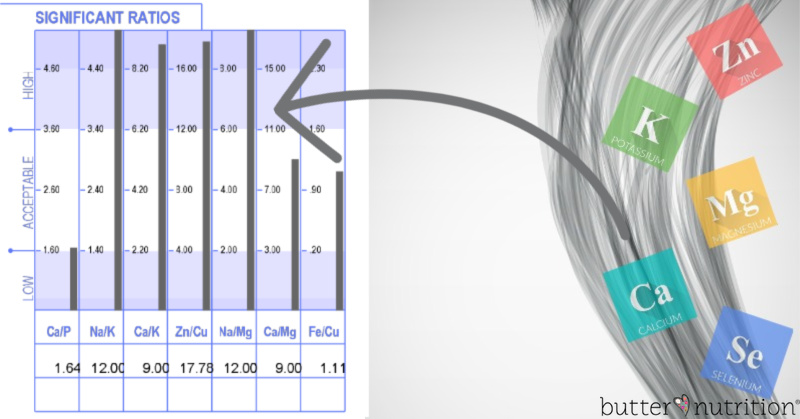 I've been meaning to write about the significant ratios in hair analysis for some time now, because they are so important, but between working with clients and balancing life, it's taken a while for me to finally get to it.
I've been meaning to write about the significant ratios in hair analysis for some time now, because they are so important, but between working with clients and balancing life, it's taken a while for me to finally get to it.- Metabolic type (fast or slow) via the calcium:phosphorus ratio
- Stress supportive mineral balance (think always stressed, fight or flight syndrome) via the sodium:potassium ratio
- Thyroid supportive mineral balance (think fatigue, brain fog, sluggish digestion, weight issues) via the calcium:potassium ratio
- Hormone supportive mineral balance (think PMS, hormonal imbalance) via the zinc:copper ratio
- Adrenal supportive mineral balance (think always tired, feel run down) via the sodium:magnesium ratio
- Blood sugar supportive mineral balance (think hangry, moody, energy dips during the day) via the calcium:magnesium ratio
Significant Ratios - What do they represent?
Metabolic Type (calcium:phosphorus ratio)
Stress Ratio (sodium:potassium ratio)
Thyroid Ratio (calcium:potassium ratio)
While I've written in-depth about this ratio here, let me give you the cliff notes version. You need proper balance between calcium and potassium to support optimal thyroid health from the mineral perspective, but the common American lifestyle compounds this problem twofold - forcing calcium level too high (often by supplementing too much vitamin D), and potassium levels too low (often from stress, dieting, and eating processed foods).
This makes the thyroid ratio go waaaaaaaay out of balance, and chances are, you may be familiar with the way that makes you feel.
You see, calcium slows things down in the body if you have too much of it, but high calcium levels are now commonplace due to Vitamin D supplementation. In short, it's often not from eating too much calcium-rich food, but instead a product of vitamin D supplementation. Vitamin D supplements tell your gut to absorb more calcium from your food than you would otherwise. The even worse supplement combination would be supplementing high amounts of vitamin D and calcium at the same time.
According to Trace Element Lab, "The inhibitory action of calcium on the thyroid has been suspected since the last century, but more recent studies have confirmed its effects. It is known that calcium decreases thyroid activity and that calcium absorption is increased in thyroid insufficiency. Vitamin D would also be considered to contribute to lowered thyroid function due to its close, synergistic relationship to calcium." [2]
Hormone Ratio (zinc:copper ratio)
Adrenal Ratio (sodium:magnesium ratio)
The sodium to magnesium ratio is all about adrenal regulation. Sodium is regulated by adrenal hormones whereas magnesium is greatly depleted under the stress response giving a snapshot of your adrenal health from the mineral perspective.
Blood Sugar Ratio (calcium:magnesium ratio)
The parathyroid and thyroid glands, along with estrogen, largely regulate calcium and magnesium levels. A low Ca/Mg ratio suggests low insulin levels, while a high Ca/Mg ratio can suggest parathyroid hormone dominance.
Where is your body at?
I hope this gives you further insight into why I'm such a fan of hair analysis and the unique snapshot it provides of your unique body chemistry. If you're ready to get this kind of insight into the interworking of your own body, you can get started with hair analysis here.
Important note: I always recommend a consultation with any hair analysis purchase to dive deep into your health history, supplement usage that can influence mineral health, lifestyle factors and habits that can contaminate hair mineral results (zinc-based dandruff shampoos, water softeners, Epsom salt baths where the hair is soaked and more). That way, you can get the most value out of your Hair Analysis Purchase.
PIN IT:
References:
- http://t.traceelements.com/Docs/newsletternov-dec2010.pdf
- http://www.traceelements.com/Docs/The%20Nutritional%20Relationships%20of%20Thyroid.pdf







Kristen Lavalley says
Hello! Have you ever written an article on the toxic ratios on a HTML? My significant ratios were mostly ok but the toxic ratios were CRAZY.
Catherine Crow, NTP says
I don't pay any attention to the toxic ratios. It's too deep in the mineral weeds to be helpful to my clients.
Abundantly,
Catherine